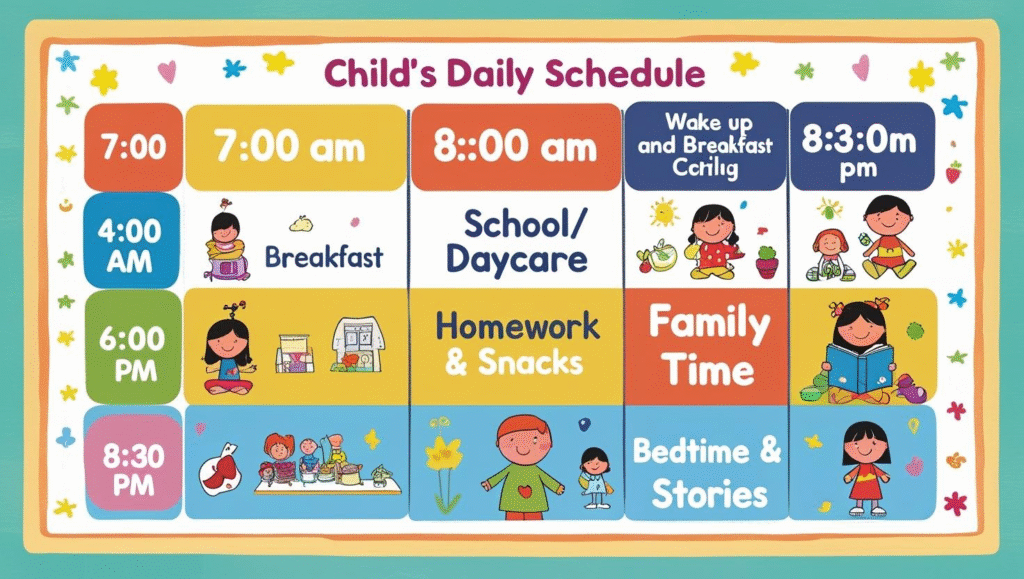Introduction: Embracing the Journey of Single Parenting

Single parenting is not a negative thing, and being a single parent is not a flaw—it’s a beautiful testament to your strength and love. No matter what your reason is for becoming a single parent, the right single parenting tips can help you build a better, more positive life for both you and your children.http://single-parenting-tips-raise-resilient-kids
In this blog, we’ll share powerful and practical single parenting tips to help you raise emotionally strong children, maintain your own mental health, and create a stable, loving home environment.
🔗 Related Post: How to Raise Confident and Happy Kids: A Parent’s Guide – Theparentzy.com
1. Learn to Acknowledge and Accept Your Emotions

Single parenting comes with a whirlwind of emotions—sometimes guilt, sometimes loneliness, and other times stress. Instead of suppressing these feelings, accepting them is the first step toward growth.
✅ Real-Life Example
Nia, a single parent, used to feel guilty during emotional highs and lows, worrying that her children didn’t have a “complete family.” But through therapy, she learned that a complete family is built on love and support—not on numbers.
🌱 What You Can Do:
- Keep a daily journal to reflect on your feelings.
- Talk to a friend or join a support group.
- Seek professional help when needed.
🧠 Backlink: BetterHelp – Online Therapy for Parents
2. Create a Routine That Gives Kids a Sense of Security
Children thrive in structured environments. When they know what to expect and when, they feel more secure—and this positively impacts their behavior and emotional growth.

🕒 Sample Daily Routine:
| Time | Activity |
|---|---|
| 7:00 AM | Wake up and breakfast |
| 8:00 AM | School/Daycare |
| 4:00 PM | Homework & Snacks |
| 6:00 PM | Family Time |
| 8:30 PM | Bedtime and stories |
✅ Real-Life Example:
Ravi, a single dad, created a “morning checklist” for his 6-year-old daughter. It included brushing teeth, packing her school bag, etc. She loved checking off tasks—this made her more disciplined and responsible.
🔗 Related Post: Healthy Routines for Kids: Sleep, Screen Time, and Nutrition – Theparentzy.com
3. Practice Open Communication with Your Child
Good communication builds trust. When children feel heard and understood, they grow emotionally strong and feel safe with their parent.
✅ Real-Life Example:
Sarah made a “feelings jar” where her son could drop notes describing his emotions. Every weekend, they would read and discuss them together. It became their special bonding activity.
🗣️ Tips:
- Talk in age-appropriate language.
- Don’t interrupt your child when they’re speaking.
- Ask open-ended questions like “How did that make you feel?”
🔗 Inner Link: Effective Communication Tips for Building Strong Parent-Child Relationships – Theparentzy.com
4. Build Your Own Support System

Managing everything alone is nearly impossible. Getting support isn’t a weakness—it’s a part of smart parenting.
🛠️ Where to Find Support:
- Trusted friends and family
- WhatsApp parenting groups or Facebook communities
- Teachers and school counselors
- NGOs or local parenting meetups
✅ Real-Life Example:
Meera, a single mom of twins, joined a local parenting support group. She found emotional support, babysitting help, and even made new friends.
🌐 Backlink: Single Parent Alliance Resource Center
5. Talk Honestly About the Other Parent
Children may feel confused or guilty about the absence of the other parent. It’s important to be honest—but in a way they can understand.
🗣️ What You Can Say:
- “Mommy/Daddy loves you, even if they’re not around right now.”
- “We both care about you, just in different ways.”
- “Sometimes grown-ups make hard decisions.”
✅ Real-Life Example:
Kabir, a single dad, calmly explained to his 10-year-old son that his mother leaving wasn’t anyone’s fault. It helped the child let go of guilt and feel more secure.
6. Start Teaching Responsibility Early
The sooner a child learns to be responsible, the more confident and independent they become. Start with small age-appropriate tasks.
🧹 Age-Based Responsibilities:
| Age Group | Tasks You Can Assign |
|---|---|
| 3–5 years | Pick up toys, help set the table |
| 6–9 years | Pack lunch, water plants |
| 10+ years | Manage homework, simple cooking |
✅ Real-Life Example:
Nadia would take her 8-year-old son grocery shopping. Through it, he learned about budgeting, comparing prices, and choosing healthy options—all through real-life experience.
🔗 Inner Link: Top 7 Mistakes New Parents Make (And How to Avoid Them) – Theparentzy.com
7. Discipline with Love and Logic
Discipline doesn’t require yelling or hitting. Instead, use calm, logical consequences that help children learn from their actions.
✅ Real-Life Example:
Reena’s son was hitting classmates at school. Instead of shouting, she calmly explained the effect of his actions and helped him write an apology letter. He learned empathy and accountability.
✔️ Smart Discipline Strategies:
- Set clear rules (like screen time limits)
- Use natural consequences instead of punishment
- Praise good behavior consistently
8. Prioritize Quality Time Over Quantity
You might not have a lot of time, but meaningful moments matter more than how many hours you spend.
💡 Ideas:
- Bedtime storytelling
- Pancake breakfast on weekends
- Evening walk for 15 minutes
✅ Real-Life Example:
Jay, who works night shifts, makes Saturday breakfast special with his son. They cook together and talk about the week—it’s their bonding ritual.
9. Don’t Forget to Take Care of Yourself

A healthy parent is a better parent. Your well-being is just as important as your child’s.
🧘♀️ Self-Care Tips:
- Take 15 minutes each day for yourself
- Go for a morning walk or do simple stretches
- Stay hydrated and eat balanced meals
✅ Real-Life Example:
Priya dedicates every Sunday evening to herself. Whether it’s watching a movie or reading, that “me-time” recharges her for the coming week.
🌐 Backlink: Mindful.org – Self-Care for Parents
10. Help Your Child Build Emotional Resilience
Your children learn by watching you. If you show emotional strength during hard times, they will too.
💪 What to Teach Them:
- Face challenges head-on
- Learn from failure
- Value effort over results
✅ Real-Life Example:
Tanya’s son failed a math test and felt defeated. Instead of scolding him, she said, “Let’s figure out what went wrong so you can do better next time.” He learned that failure isn’t the end.
11. Celebrate Your Family’s Unique Identity
Don’t chase the “perfect” family image. Celebrate what makes your family special—create your own traditions and identity.
💡 Ideas:
- Friday dance nights
- Monthly goal-setting as a family
- “Family Day” with treats and bonding
✅ Real-Life Example:
Rohan and his daughter celebrate “Family Day” every 15th of the month. They go for ice cream and talk about their dreams and wins—just the two of them.
12. Plan Your Finances Carefully
Money can be a big source of stress. Planning your finances helps ensure your child’s future and your peace of mind.
💰 Tips:
- Use budgeting apps like Walnut or YNAB
- Build an emergency fund—even small amounts help
- Teach your child basic money skills
🌐 Backlink: SmartParenting – Budgeting for Single Moms
Conclusion: You Are More Than Enough

Single parenting may be difficult—but it’s far from impossible. You are already doing the hardest and most important job: raising your child with love and strength.
With these single parenting tips, you can raise confident, kind, emotionally resilient children—and feel fulfilled and balanced while doing it. Believe in yourself. You are exactly the parent your child needs.
🔗 Recommended Posts from TheParenzy:
- How to Handle Toddler Tantrums: A Step-by-Step Guide for Parents – Theparentzy.com
- How to Raise Confident and Happy Kids: A Parent’s Guide – Theparentzy.com
- Effective Communication Tips for Building Strong Parent-Child Relationships – Theparentzy.com
💬 We’d Love to Hear from You!
Are you a single parent? What’s your story? Share in the comments or email us at Hibaofficial21@gmail.com — we’d love to feature your journey!
Thank you





Pingback: What to Expect in the First Trimester of Pregnancy - Theparentzy.com